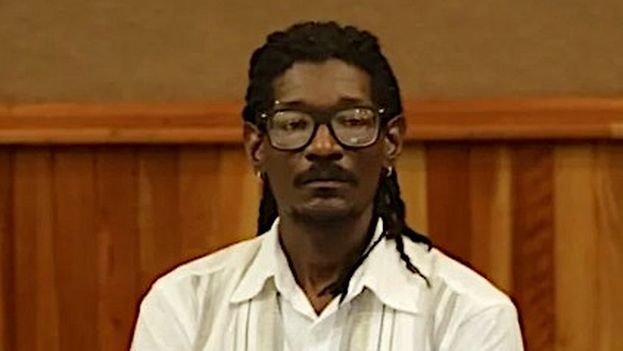
![]() 14ymedio, Luz Escobar, Havana, 9 November 2017 — An arbitrary arrest is not the same if on the other side of the bars there is a family willing to ask questions or a friend who dares to investigate. Roberto Jiménez Gutiérrez believed that no one would notice his absence, which began on October 23 when the police crossed his path, but the reaction outside of Cuba surprised him.
14ymedio, Luz Escobar, Havana, 9 November 2017 — An arbitrary arrest is not the same if on the other side of the bars there is a family willing to ask questions or a friend who dares to investigate. Roberto Jiménez Gutiérrez believed that no one would notice his absence, which began on October 23 when the police crossed his path, but the reaction outside of Cuba surprised him.
“I was held incommunicado for sixteen days in the Technical Investigation Department at 100 and Aldabó,” the leader of the independent organization Juventud Activa Cuba Unida (JACU — Active Youth, United Cuba), which describes his arrest as a “kidnapping,” he tells this newspaper. “But the officers never told me where I was, I knew that from other prisoners,” he explains by telephone after being released last Tuesday.
In Jiménez’s mind, the days in the cell passed slowly without any logic. “Almost every day they interrogated me, but the most intense moments were the first 72 hours,” he recalls.
The opponent was on his way to José Martí International Airport, in Havana, to take a flight to Miami where he planned to participate in a dinner organized by the Legal Rescue Foundation (FRJ).
At dawn, police stopped the car in which he was traveling to the airport and told the driver to leave. “Everything that followed was very violent,” the JACU leader explains now. “I demanded that they show me a document that validated my arrest and then they hit me in the chest.”
After that the memories are confusing. Four policemen forced him into a patrol car and pushed him down in such a way that he could not even see the road the vehicle was traveling along.
“I am being accused of association, meetings and illicit demonstrations,” an offense for which one can receive from “three months to one year of deprivation of liberty.” The police also warned him, without showing him any papers, that he was going to be charged under Law 88, also known as the Gag Law.
The draconian legislation is the same as that which led to the imprisonment of 75 opponents and independent journalists in 2003, in a repressive wave known as the Black Spring. The dissidents tried in that case were sentenced to sentences as long as 30 years.
Under those rules Jiménez could be prosecuted for accumulating, reproducing and disseminating “information or documentation that goes against the Government.” The officers who interrogated him did not succeed in getting him to confess to the accusation. “They did not get anything, I held my position.”
That same day, the activist César Mendoza, director of the Center for Studies for Local Development (CEDEL), was also arrested. He was also going to participate in the meeting in Miami together with Jiménez, as well as be part of a panel at the recently concluded Cuba Internet Freedom meeting.
Mendoza saw him last Saturday when he was taken to another detention center, and cannot say where he is being held because he was moved in a fetal position. “They wanted to confront us with each other so we would implicate each other,” he explains. But neither of the activists confirmed the police hypothesis.
Now, Jiménez will have to go every Monday to 100 and Aldabó to sign a record and is awaiting a trial that does not yet have a date. “In the detention they confiscated a laptop, money and a tablet that were part of the things I was taking with me for the trip,” he adds.
The government repressors still do not understand why JACU works in the training of young people and “everything is done without profit and rests on the basis of human rights and democracy so that they can direct their actions and define their future.”
The activist recognizes that lately they have had to change the places where they meet “due to the pressures from State Security.” His arrest was one more drop in a cascade of arrests, threats and seizures.
“I do not have a family and they took advantage of that,” Jiménez laments, but in the days after his arrest a whole hosts of relatives materialized. The human rights organization Freedom House publicized his case and social networks filled with demands for his release.
When Roberto Jiménez Gutiérrez returned to walk through the streets of Havana his phone did not stop ringing. A new family had emerged during those 16 days of confinement.
